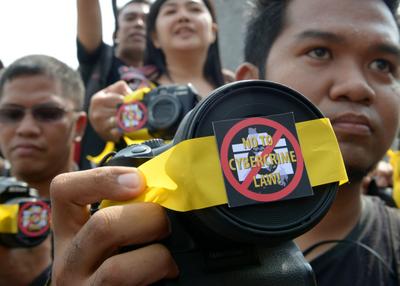Amid mounting pressure, on 9 October the Supreme Court issued a temporary restraining order suspending the CPA for 120 days. What do these developments mean for a president who draws his lineage from the 1986 People Power movement that swept the Philippines from authoritarian rule? Is the president displaying latent authoritarianism?
Scores of protestors, including academics, journalists, lawyers, the Philippine Bar Council, front organisations of the Communist Party of the Philippines and a shadowy online presence known as Anonymous Philippines, rose in opposition to the CPA, otherwise referred to as Republic Act No. 10175. There have long been calls for a cybercrime prevention act ever since Onel de Guzman, a Philippine national, escaped prosecution for his role in unleashing the ‘ILOVEYOU’ virus on the world. But in the short time since the CPA has been signed into law, 15 petitions opposing it have been sent to the Philippine Supreme Court. Incidents of hacking by Anonymous Philippines and Anonymous Global saw Philippine websites such as the Metropolitan Waterworks and Sewerage System, the Bangko Sentral ng Pilipinas and the Pilipinas Anti-Piracy Team taken down.
These actions were mostly over section 4(c)(4) of the CPA, which criminalises libel. Legal practitioners have pointed to serious flaws in the CPA, specifically the unclear definition and ambiguity of what constitutes an act of online libel. Further, the CPA purportedly increases the punishment for online libel to 12 years in prison. To drive home the point that the CPA lacks clarity, some observers have remarked, in alarmist fashion, that merely ‘liking’ a Facebook post could potentially breach the ‘cyber-libel’ provision.
There was also unhappiness over section 19, which allows for the restriction of any computer data that the Department of Justice finds prima facie in breach of the CPA provisions, dubbed the ‘take down’ clause. Along with section 12, which allows real-time collection of ‘traffic data’, the CPA gives Philippine law enforcement agencies unprecedented powers not seen since the imposition of martial law in 1972 by the late president Ferdinand Marcos.
There is no escaping the irony that the president, son of the late president Corazon Aquino and figurehead of the 1986 People Power movement that swept away the authoritarian Marcos regime, signed into law an act that is potentially unconstitutional and would affect the country’s freedom of expression.
This latest move touches the very heart of political participation in the country, a force that has at last count managed to overthrow not only the Marcos regime but also ended Joseph E. Estrada’s presidency in January 2001. Estrada’s ouster is illustrative of the ability of the tech-savvy, but numerically miniscule, Philippine middle class to mobilise and be politically efficacious through the use of new and emerging technologies.
In 2001, the technological enabler was the cellular phone, through the cheap and ubiquitous text messaging introduced by telecommunications companies at the time. Fast forward to the last presidential elections in May 2010, then-candidate Aquino III’s communications team proved themselves tech-savvy: able to tap into the grassroots, albeit of that of the mobile phone-toting, laptop-carrying urbanite.
While still developing, many studies are confident of the efficacy of online campaigning on Philippine electoral success, concluding that social media can be a force multiplier in a closely contested electoral battle. Candidate Aquino’s communications team was certainly on the ball in 2010.
This latest debacle over the CPA is seemingly indicative of a heavy-handed approach in managing a society very much committed to free speech. A damaging comparison between the speed at which the CPA was passed and the proposed Freedom of Information Act (FOIA), which is failing to pass through parliament, provides another case in point. The president himself stated that a FOIA might be misused, taking a stab at the notoriously rambunctious Philippine media, whom he fears could focus unneeded attention on small missteps of his administration and ‘who will always look at the bottle half empty’.
As the Philippines has one of the highest internet penetration rates in the region, and is dubbed the world’s social networking capital, there is no doubt that the CPA would have a profound effect on online participation in the country. In a bold move, the president stated that the cyber-libel provision would not be removed, in the face of retractions by some legislators who voted for the CPA.
The online Philippine community will have to wait until January next year when the Supreme Court has scheduled oral arguments by parties to the petitions to know the outcome of the CPA. In the meantime, with mid-term elections just around the corner, certain members of the Aquino government will likely be finding out whether they are able to poll enough ‘likes’ to continue staying in Malacañang or be virtually cast out into the streets.
Joseph Franco and Yeap Su Yin are Associate Research Fellows at the Centre of Excellence for National Security at the S. Rajaratnam School of International Studies.

